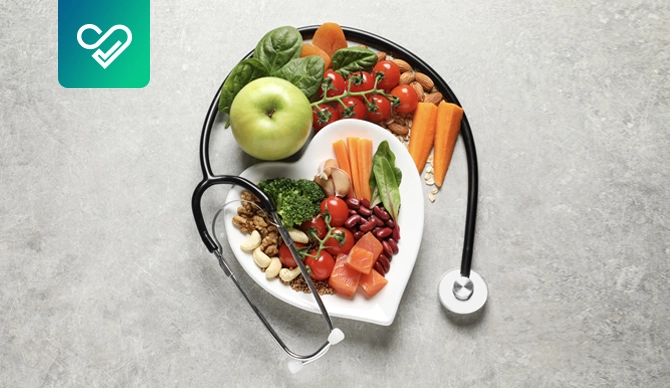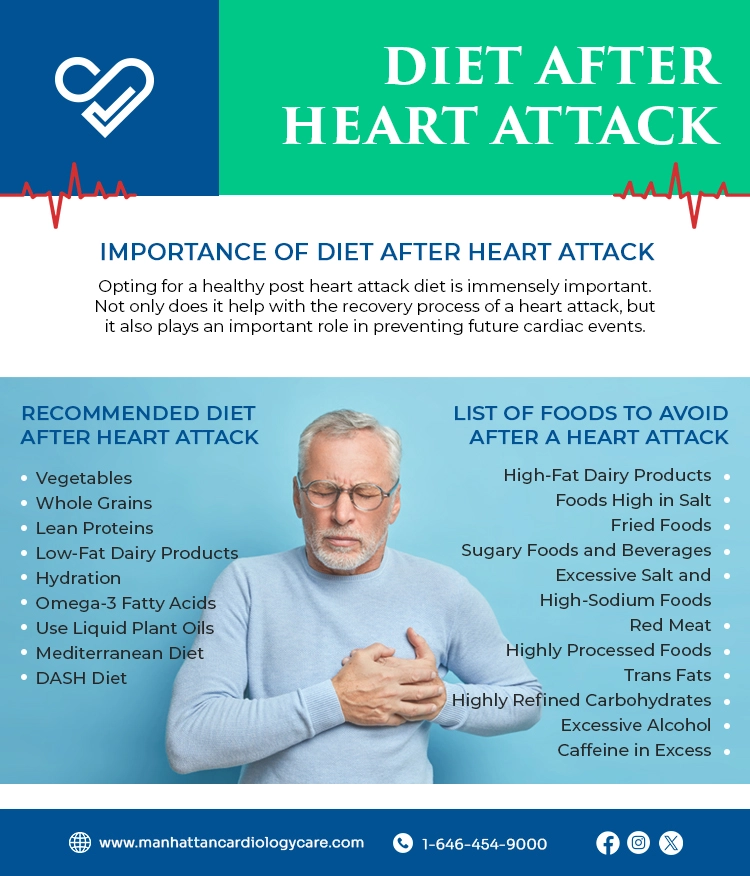When it comes to serious heart conditions, could something as simple as your diet impact the health of your heart?
As you lay awake at night, thinking about everything that led to your recent heart attack, that’s when questions about your lifestyle and dietary choices come to mind.
How much of a role did your diet play? Could something as harmless as a late-night snack have contributed to your heart condition?
In today’s blog, we will explore the complicated relationship between your diet and heart health. How it contributes to the development of heart problems, and the diet after heart attack, that needs to be followed for optimal recovery.
Table of contents
Can Unhealthy Diet Cause Heart Attack?
Absolutely! An unhealthy diet that includes processed foods, excessive saturated fats, high sodium, and added sugars can definitely contribute to heart diseases; including high cholesterol, hypertension, obesity, and diabetes. Eventually, these factors can cause a life-threatening heart attack.
Importance of Diet After Heart Attack
Opting for a healthy post heart attack diet is immensely important. Not only does it help with the recovery process of a heart attack, but it also plays an important role in preventing future cardiac events.
By nourishing your body with the appropriate heart attack diet, you can maximize your heart’s resilience, optimize your cholesterol levels, regulate blood pressure, and maintain a healthy weight.
Recommended Diet After Heart Attack
Listed below are all the foods that should be included in your post heart attack diet, allowing you to recover fast and maintain heart health.
- Vegetables: Rich in fiber, vitamins, and minerals, vegetables are one of the main parts of a heart attack diet.
- Whole Grains: Opt for whole grains like brown rice, quinoa, oats, and whole wheat bread to fuel your body with sustained energy.
- Lean Proteins: Choose lean sources of protein such as skinless poultry, fish, legumes, and tofu to support muscle repair and growth.
- Low-Fat Dairy Products: Incorporate low-fat dairy options like skim milk, yogurt, and cheese to meet your calcium needs without excess saturated fat.
- Hydration: Stay hydrated with water, herbal teas, and low-calorie beverages to maintain optimal heart function.
- Omega-3 Fatty Acids: Include sources of omega-3 fatty acids such as salmon, walnuts, flaxseeds, and chia seeds to reduce inflammation and promote heart health.
- Use Liquid Plant Oils: Substitute butter and margarine with liquid plant oils like olive oil, canola oil, and avocado oil for heart-healthy fats.
- Mediterranean Diet: Choose to go with Mediterranean diet, which is rich in fruits, vegetables, nuts, and olive oil; all of which are known for their cardiovascular benefits.
- DASH Diet: Follow the Dietary Approaches to Stop Hypertension (DASH) diet, focusing on fruits, vegetables, whole grains, and lean proteins to lower blood pressure and improve heart health.
List of Foods To Avoid After a Heart Attack
There are certain foods that should be avoided when going through the recovery process of a heart attack. Here’s a list of most foods that should be excluded from your heart attack diet:
- High-Fat Dairy Products: Limit consumption of high-fat dairy products such as whole milk, cheese, and cream to reduce intake of saturated fats.
- Foods High in Salt: Steer clear of processed foods, canned soups, and salty snacks to minimize sodium intake and lower blood pressure.
- Fried Foods: Avoid fried foods like french fries, fried chicken, and potato chips, which are filled with unhealthy trans fats and contribute to inflammation.
- Sugary Foods and Beverages: Cut back on sugary treats, sodas, and sweetened beverages to mitigate the risk of obesity, diabetes, and heart disease.
- Excessive Salt and High-Sodium Foods: Be wary of excessive salt and high-sodium foods like deli meats, fast food, and frozen meals, as they can elevate blood pressure and strain the heart.
- Red Meat: Limit the consumption of red meat and processed meats like bacon and sausage, as they are high in saturated fats and may increase cholesterol levels.
- Highly Processed Foods: Minimize the intake of highly processed foods like packaged snacks, sugary cereals, and convenience meals, which often contain unhealthy additives and preservatives.
- Trans Fats: Avoid foods that contain trans fats, such as commercially baked goods, fried foods, and margarine, as they increase bad cholesterol and lower good cholesterol levels.
- Highly Refined Carbohydrates: Choose whole grains over refined carbohydrates like white bread, white rice, and sugary cereals; which can spike blood sugar levels and contribute to insulin resistance.
- Excessive Alcohol: Limit alcohol consumption to moderate levels, as excessive drinking can increase blood pressure, triglycerides, and the risk of heart disease.
- Caffeine in Excess: Moderate your caffeine intake from coffee, tea, and energy drinks, as excessive consumption may trigger palpitations and increase blood pressure.
Can Diet Prevent a Heart Attack?
Just following a healthy diet alone cannot guarantee prevention from a heart attack – however, adopting a heart-healthy diet can significantly reduce the risk of cardiovascular diseases.
By prioritizing nutritious foods, maintaining a healthy weight, and incorporating regular physical activity into your lifestyle, you can secure your heart against the effects of poor dietary choices.
When To See a Doctor?
If you have experienced a heart attack or suspect that you may be at risk due to your diet or lifestyle choices, it is necessary for you to seek medical attention instantly.
Your healthcare provider can assess your individual risk factors, prescribe appropriate medications, and offer personalized guidance on dietary and lifestyle modifications to safeguard your heart health.
Disclaimer
This blog is for informational & educational purposes only, and does not intend to substitute any professional medical advice or consultation. For any health related concerns, please consult with your physician, or call 911.

